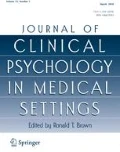Abstract
This article was co-authored by a senior mentor and one of her students who worked with her as both an intern and a postdoctoral fellow. It is an expanded version of a presentation given by the first author after receiving the Association of Psychologists in Academic Health Centers (APAHC) Distinguished Achievement in Teaching Award. The article offers a historical view on mentoring, defines and describes the term, and delineates the characteristics of good mentors and mentees. The significant impact of mentoring on the professional and personal development of psychology interns and postdoctoral residents and their mentors in academic health centers is explored. Techniques for developing, maintaining, and promoting effective mentoring relationships are provided and the ethical considerations related to mentoring are examined.
Similar content being viewed by others
References
Allen, T. D., Poteet, M. L., Eby, L. T., Lentz, E., & Lima, L. (2004). Career benefits associated with mentoring for proteges: A meta-analysis. Journal of Applied Psychology, 89, 127–136.
Berk, R. A., Berg, J., Mortimer, R., Walton-Moss, B., & Yeo, T. P. (2005). Measuring the effectiveness of faculty mentoring relationships. Academic Medicine, 80, 66–71.
Browne-Ferrigno, T., & Muth, R. (2004). Leadership mentoring in clinical practice: Role socialization, professional development, and capacity building. Educational Administration Quarterly, 40, 468–494.
Chao, G. T., Walz, P. M., & Gardner, P. D. (1992). Formal and informal mentorships: A comparison on mentoring functions and contrast with nonmentored counterparts. Personnel Psychology, 45, 619–636.
Daresh, J. (2004). Mentoring school leaders: Professional promise or predictable problems? Educational Administration Quarterly, 40, 495–517.
Drotar, D. (2003). Martin P. Levin distinguished mentorship award: Reflections on mentorship in pediatric psychology: Key issues and implications. Journal of Pediatric Psychology, 28, 309–314.
Drotar, D., & Avner, E. (2003). Critical choices in mentoring the next generation of academic pediatricians: Nine circles of hell or salvation? Journal of Pediatrics, 142, 1–2.
Eby, L. T., McManus, S. E., Simon, S. A., & Russell, J. E. A. (2000). The protege’s perspective regarding negative mentoring experiences: The development of a taxonomy. Journal of Vocational Behavior, 57, 1–21.
Ehrich, L. C., Hansford, B., & Tennent, L. (2004). Formal mentoring programs in education and other professions: A review of the literature. Educational Administration Quarterly, 40, 518–540.
Fagenson, E. A. (1989). The mentor advantage: Perceived career/job experiences of proteges versus non-proteges. Journal of Organizational Behavior, 10, 309–320.
Feldman, D. C., Folks, W. R., & Turnley, W. H. (1999). Mentor-protege diversity and its impact on international internship experiences. Journal of Organizational Behavior, 20, 597–611.
Humble, A. M., Solomon, C. R., Allen, K. R., Blaisure, K. R., & Johnson, M. P. (2006). Feminism and mentoring of graduate students. Family Relations, 55, 2–15.
Johnson, W. B. (2002). The intentional mentor: Strategies and guidelines for the practice of mentoring. Professional Psychology: Research and Practice, 11, 88–96.
Johnson, W. B. (2003). A framework for conceptualizing competence to mentor. Ethics and Behavior, 13, 127–151.
Johnson, W. B. (2007). Transformational supervision: When supervisors mentor. Professional Psychology: Research and Practice, 38, 259–267.
Johnson, W. B., & Huwe, J. M. (2002). Toward a typology of mentorship dysfunction in graduate school. Psychotherapy: Theory, Research, & Practice, 39, 44–55.
Johnson, W. B., & Huwe, J. M. (2003). Getting mentored in graduate school. Washington, DC: American Psychological Association.
Johnson, W. B., Koch, C., Fallow, G. O., & Huwe, J. M. (2000). Prevalence of mentoring in clinical versus experimental doctoral programs: Survey findings, implications, and recommendations. Psychotherapy: Theory, Research, Practice, Training, 37, 325–334.
Johnson, W. B., & Zlotnik, S. (2005). The frequency of advising and mentoring as salient work roles in academic job advertisements. Mentoring and Tutoring, 13, 95–107.
Koocher, G. P. (2002). Mentor revealed: Masculinization of an early feminist construct. Professional Psychology: Research and Practice, 33, 509–510.
Kram, K. (1985). Mentoring at work: Developmental relationships in organizational life. Glenview, IL: Scott, Foresman.
McDonald, K. S., & Hite, L. M. (2005). Ethical issues in mentoring: The role of HRD. Advances in Developing Human Resources, 7, 569–582.
Mertz, N. T. (2004). What’s a mentor, anyway? Educational Administration Quarterly, 40, 541–560.
Mohberg, D. J., & Velasquez, M. (2004). The ethics of mentoring. Business Ethics Quarterly, 14, 95–122.
O’Neill, R. M., & Blake-Beard, S. D. (2002). Gender barriers to the female mentor – male protege relationship. Journal of Business Ethics, 37, 51–63.
Ponce, A. N., Williams, M. K., & Allen, G. J. (2005). Toward promoting generative cultures of intentional mentoring within academic settings. Journal of Clinical Psychology, 61, 1159–1163.
Ragins, B. R., Cotton, J. L., & Miller, J. S. (2000). Marginal mentoring: The effects of type of mentor, quality of relationship, and program design on work and career attitudes. Academy of Management Journal, 43, 1177–1194.
Rose, G. L., Rukstalis, M. R., & Schuckit, M. A. (2005). Informal mentoring between faculty and medical students. Academic Medicine, 80, 344–348.
Sambunjak, D., Straus, S. F., & Marusie, A. (2006). Mentoring in academic medicine: A systematic review. Journal of the American Medical Association, 296, 1103–1115.
Scandura, T. A. (1992). Mentorship and career mobility: An empirical investigation. Journal of Organizational Behavior, 13, 169–174.
Scandura, T. A. (1998). Dysfunctional mentoring relationships and outcomes. Journal of Management, 24, 449–467.
Smith, J. W., Smith, W. J., & Markham, S. E. (2000). Diversity issues in mentoring academic faculty. Journal of Career Development, 26, 251–262.
Author information
Authors and Affiliations
Corresponding author
Additional information
This article is based upon an invited address, “Mentoring of Predoctoral Interns and Postdoctoral Fellows in an Academic Health Sciences Center” given by the first author in recognition of the author’s receipt of the Association of Psychologists in Academic Health Centers 2005 Award for Distinguished Achievement in Teaching. The address was presented at the Annual meeting of the American Psychological Association, New Orleans, LA, August, 2006.
Rights and permissions
About this article
Cite this article
Kaslow, N.J., Mascaro, N.A. Mentoring Interns and Postdoctoral Residents in Academic Health Sciences Center. J Clin Psychol Med Settings 14, 191–196 (2007). https://doi.org/10.1007/s10880-007-9070-y
Published:
Issue Date:
DOI: https://doi.org/10.1007/s10880-007-9070-y




